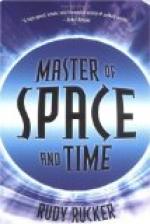The telephone which Bell had invented, and on which he received a patent on his twenty-ninth birthday, consisted of two instruments similar in principle to what we would now call receivers. If you will experiment with the receiver of a modern telephone you will find that it will transmit as well as receive sound. The heart of the transmitter was an electro-magnet in front of which was a drum-like membrane with a piece of iron cemented to its center opposite the magnet. A mouthpiece was arranged to throw the sounds of the voice against the diaphragm, and as the membrane vibrated the bit of iron upon it—acting as an armature—induced currents corresponding to the sound-waves, in the coils of the electro-magnet.
Passing over the line the current entered the coils of the tubular electro-magnet in the receiver. A thin disk of soft iron was fastened at the end of this. When the current-waves passed through the coils of the magnet the iron disk was thrown into vibration, thus producing sound. As it vibrated with the current produced by the iron on the vibrating membrane in the transmitter acting as an armature, transmitter and receiver vibrated in unison and so the same sound was given off by the receiver and made audible to the human ear as was thrown against the membrane of the transmitter by the voice.
The patent issued to Bell has been described as “the most valuable single patent ever issued.” Certainly it was destined to be of tremendous service to civilization. It was so entirely new and original that Bell found difficulty in finding terms in which to describe his invention to the patent officials. He called it “an improvement on the telegraph,” in order that it might be identified as an improvement in transmitting intelligence by electricity. In reality the telephone was very far from being a telegraph or anything in the nature of a telegraph.
As Bell himself stated, his success was in large part due to the fact that he had approached the problem from the viewpoint of an expert in sound rather than as an electrician. “Had I known more about electricity and less about sound,” he said, “I would never have invented the telephone.” As we have seen, those electricians who worked from the viewpoint of the telegraph never got beyond the limitations of the instrument and found that with it they could transmit signals but not sounds. Bell, with his knowledge of the laws of speech and sound, started with the principles of the transmission of sound as a basis and set electricity to carrying the sound-vibrations.
XIII
THE TELEPHONE AT THE CENTENNIAL
Boll’s Impromptu Trip to the Exposition—The Table Under the Stairs—Indifference of the Judges—Enter Don Pedro, Emperor of Brazil—Attention and Amazement—Skepticism of the Public—The Aid of Gardiner Hubbard—Publicity Campaign.
The Philadelphia Centennial Exposition—America’s




